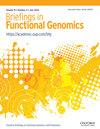基于深度学习的长非编码 RNA 相互作用机制识别与预测综述
IF 2.5
3区 生物学
Q3 BIOTECHNOLOGY & APPLIED MICROBIOLOGY
引用次数: 0
摘要
随着测序技术和基因组学研究的发展,人们发现长非编码 RNA(lncRNA)广泛参与真核生物的表观遗传、转录和转录后调控过程。因此,它们在人体的正常生理和各种疾病结果中发挥着至关重要的作用。目前,大量未知的 lncRNA 测序数据需要探索。随着人工智能时代的到来,建立基于深度学习的 lncRNA 预测模型为研究人员提供了宝贵的见解,大大减少了与试验和错误相关的时间和成本,促进了疾病相关 lncRNA 的鉴定,以便进行预后分析和靶向药物开发。然而,大多数lncRNA相关研究人员对深度学习模型和模型选择的最新进展以及在lncRNA功能研究中的应用缺乏认识。因此,我们阐释了深度学习模型的概念,探讨了几种流行的深度学习算法及其数据偏好,结合不同的预测功能,全面回顾了过去5年中具有典范预测性能的最新文献研究,批判性地分析和讨论了当前深度学习模型和解决方案的优点和局限性,同时也基于lncRNA研究的前沿进展提出了展望。本文章由计算机程序翻译,如有差异,请以英文原文为准。
A comprehensive survey on deep learning-based identification and predicting the interaction mechanism of long non-coding RNAs
Long noncoding RNAs (lncRNAs) have been discovered to be extensively involved in eukaryotic epigenetic, transcriptional, and post-transcriptional regulatory processes with the advancements in sequencing technology and genomics research. Therefore, they play crucial roles in the body’s normal physiology and various disease outcomes. Presently, numerous unknown lncRNA sequencing data require exploration. Establishing deep learning-based prediction models for lncRNAs provides valuable insights for researchers, substantially reducing time and costs associated with trial and error and facilitating the disease-relevant lncRNA identification for prognosis analysis and targeted drug development as the era of artificial intelligence progresses. However, most lncRNA-related researchers lack awareness of the latest advancements in deep learning models and model selection and application in functional research on lncRNAs. Thus, we elucidate the concept of deep learning models, explore several prevalent deep learning algorithms and their data preferences, conduct a comprehensive review of recent literature studies with exemplary predictive performance over the past 5 years in conjunction with diverse prediction functions, critically analyze and discuss the merits and limitations of current deep learning models and solutions, while also proposing prospects based on cutting-edge advancements in lncRNA research.
求助全文
通过发布文献求助,成功后即可免费获取论文全文。
去求助
来源期刊

Briefings in Functional Genomics
BIOTECHNOLOGY & APPLIED MICROBIOLOGY-GENETICS & HEREDITY
CiteScore
6.30
自引率
2.50%
发文量
37
审稿时长
6-12 weeks
期刊介绍:
Briefings in Functional Genomics publishes high quality peer reviewed articles that focus on the use, development or exploitation of genomic approaches, and their application to all areas of biological research. As well as exploring thematic areas where these techniques and protocols are being used, articles review the impact that these approaches have had, or are likely to have, on their field. Subjects covered by the Journal include but are not restricted to: the identification and functional characterisation of coding and non-coding features in genomes, microarray technologies, gene expression profiling, next generation sequencing, pharmacogenomics, phenomics, SNP technologies, transgenic systems, mutation screens and genotyping. Articles range in scope and depth from the introductory level to specific details of protocols and analyses, encompassing bacterial, fungal, plant, animal and human data.
The editorial board welcome the submission of review articles for publication. Essential criteria for the publication of papers is that they do not contain primary data, and that they are high quality, clearly written review articles which provide a balanced, highly informative and up to date perspective to researchers in the field of functional genomics.
 求助内容:
求助内容: 应助结果提醒方式:
应助结果提醒方式:


